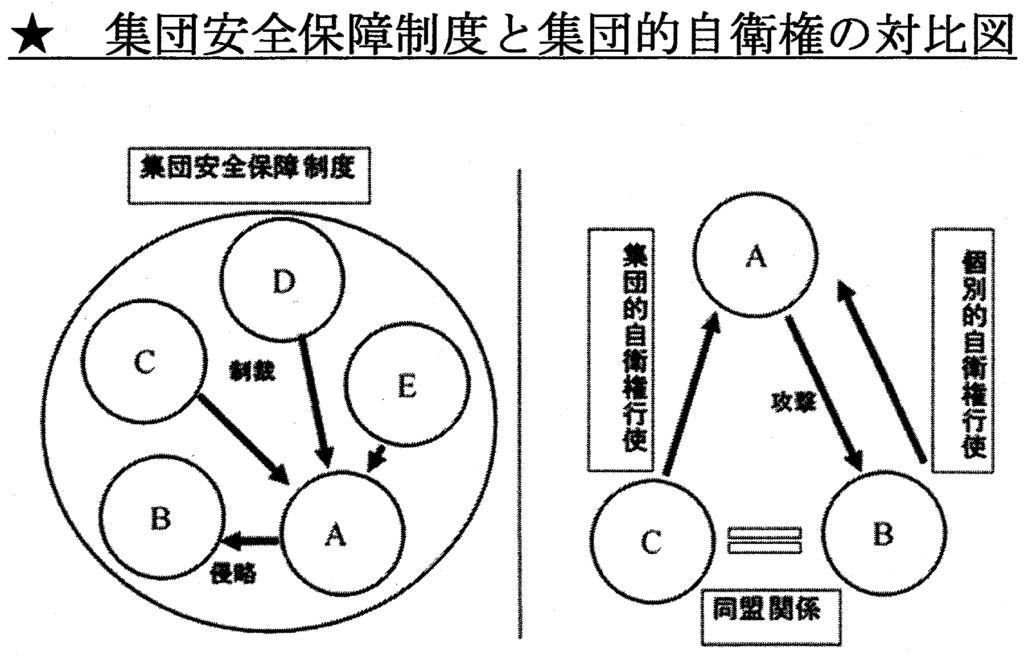佐藤 哲夫(特任教授)
*この記事は『広島平和研究所ブックレット』7号に掲載されたものです。
ここではその一部を紹介しています。
1 国際連合による集団安全保障制度
国際連合(以下、国連とする。)は国際社会における平和と安全の維持を主要な目的とする。この目的に向けて、安全保障理事会が主要な責任を負うとして、国連設立の基礎となる国連憲章は、紛争の平和的解決を第六章で、集団安全保障制度を第七章で、(それら両者について地域的国際組織との協力を第八章で)規定している。また、冷戦時代には、東西対立のために集団安全保障制度が機能しなかったことを背景として、停戦監視などのために戦わない象徴的な存在としての軍隊を派遣する平和維持活動が生み出された。この活動は冷戦解消後には増大した内戦に派遣されることに伴って、大きく変容してきているが、第七章に基づく集団安全保障制度とは異なるものである。他方で、集団安全保障制度における強制措置には、経済制裁を中核とする非軍事的強制措置と国連軍を中核とする軍事的強制措置とがある。以下、本章では、第七章に基づく集団安全保障制度における軍事的強制措置を取り上げて、その理論と実際を検討する。また、主な素材として、アジアにおける事例を扱う。
A 集団安全保障制度の理論
集団安全保障制度と集団的自衛権
まず概略を「集団安全保障制度と集団的自衛権」の対比図により説明しよう。

この図の右側にあるように、一九世紀の安全保障というのは勢力均衡、バランス・オブ・パワーの政策の下で確保されてきた。現在においても、国々は敵対国に対抗する目的で友好国と同盟関係を結ぶ。それによって、A国が攻撃した場合、B国が自ら個別的な自衛権を行使することのみならず、C国も集団的自衛権を行使する形で助けてくれる。そうすると、相手側も同じように同盟関係を結ぶ国々を探すことになり、最終的に両陣営の間である程度バランスがとれるようなことになり、お互いに相手を攻撃しづらいというようになっていくというわけである。冷戦時代でいえば、北大西洋条約機構(NATO)が西側に組織され、東側にはワルシャワ条約機構が組織されたわけである。
それに対して、左側の集団安全保障の制度というのは、対立する国々を含めて武力行使を禁止し、違反国に対して集団的に共同して対抗するということによって平和と安全を確保しようとする。集団安全保障制度では、理念的には国際社会のすべての国に参加してもらうとともに、その間で、戦争、武力行使を禁止する。それに違反してA国がB国に侵略をした場合には、残りの国がすべてこのA国に対抗してB国を助ける。ここでは、少なくとも理念的には、事前に同盟関係を結ぶということはあってはいけないわけである。
集団安全保障制度は、国際社会全体として侵略に対処するという仕組みであるので、勢力均衡政策や同盟関係に基づく個別的安全保障とは原理的に異なる国際社会全体の「公の制度」であって、そのような制度を運営する担い手としての安保理が、「公の機能」を果たす「公の組織」としての位置にあると考えられる。このことが十分に理解されてこなかったのは、冷戦期における安保理および集団安全保障制度の機能不全によるところが大きかったと思われる。
